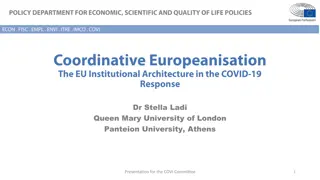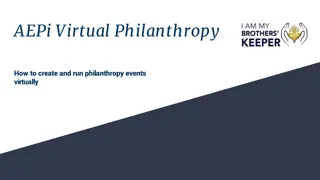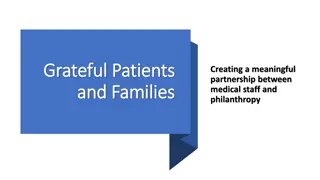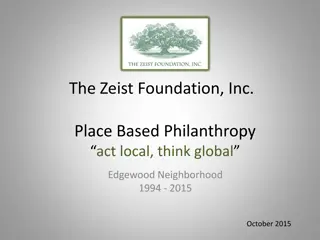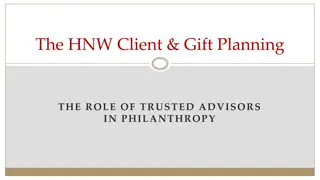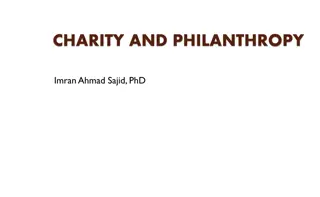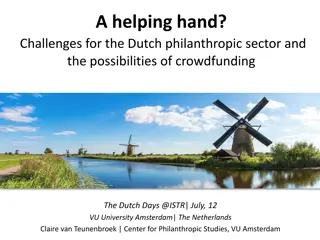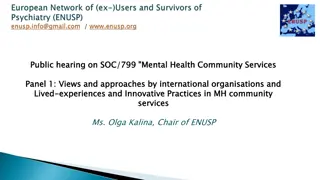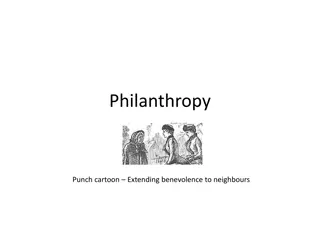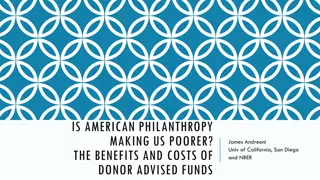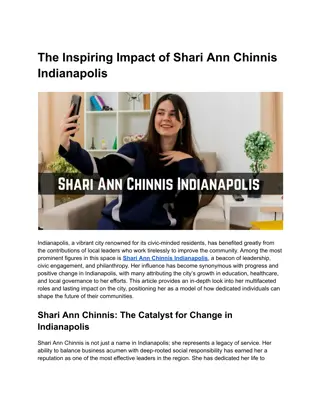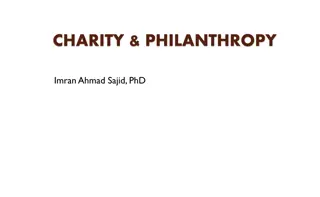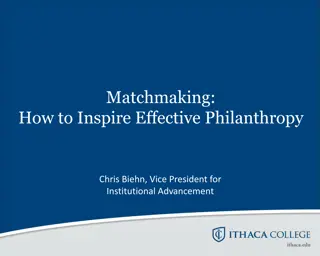Philea: Advocating for European Philanthropy Through Policy and Legal Affairs
Philea is a community of 250 foundations with substantial assets, working towards harnessing the potential of European philanthropy. They advocate for an enabling environment in policy work, connect stakeholders, and analyze foundation laws across diverse legal traditions. The Legal Affairs Committee plays a crucial role in monitoring and analyzing laws and regulations to support the philanthropic sector.
Download Presentation

Please find below an Image/Link to download the presentation.
The content on the website is provided AS IS for your information and personal use only. It may not be sold, licensed, or shared on other websites without obtaining consent from the author.If you encounter any issues during the download, it is possible that the publisher has removed the file from their server.
You are allowed to download the files provided on this website for personal or commercial use, subject to the condition that they are used lawfully. All files are the property of their respective owners.
The content on the website is provided AS IS for your information and personal use only. It may not be sold, licensed, or shared on other websites without obtaining consent from the author.
E N D
Presentation Transcript
Membership of Philea The combined membership of Philea is comprised of: 250 foundations with an annual expenditure of 22 billion and assets of over 200 billion 30 national associations representing approximately 10,000 foundations across Europe 33 countries around the world As well as affiliate members including universities, NGOs, and multilateral organisations Our community
voice of European Philanthropy Why we are here Who Who we are we are What we want to achieve Harness the immense multidimensional potential of European philanthropy Our purpose | Who we are
Philea Policy work Advocating for and connecting the sector Goal 1: Philanthropy thrives in an enabling environment We monitor & analyse policy trends at national, European, international level and engage with policymakers and other stakeholders Goal 2: The community is well connected to key stakeholders We represent the sector in different fora, create strategic engagement opportunities EuroPhilantopics: December 3rd 2024 Philea policy work
Our Legal Affairs Committee (LAC) Co-chair: The LAC, in numbers: 32 members 25 countries 23 National Associations representatives Isabel Pe alosa Spanish Association of Foundations (AEF) Ludwig Forrest King Baudouin Foundation 9 Foundation representatives Enabling Environment | LAC
Mapping laws & regulations: evidence to policy Weekly monitoring & quarterly newsletter 2021 comparative highlights 2022 European briefing of Lilly School Philanthropy Index 2023/2024 cross-border case studies 2024 update of 40 national country profiles Enabling Environment | monitoring and analysis
Comparative Highlights of Foundation Laws - 2021 Complex picture, great variety Legal traditions & cultures: civil law versus common law Definitions of public benefit either defined in tax law or framework or public benefit law vary, but common core elements are present Constantly evolving in particular tax laws Enabling Environment | analysing the laws & regulations
Taxation of public benefit foundations 1. Corporate income tax and capital gains tax exemption In the majority of countries, tax exemptions for income from asset administration and, to some extent, economic activities. Most countries tax income from unrelated economic activity but exempt income from purpose related economic activity or small scale economic activity. Rules in place to avoid unfair competition with for-profits 2. Eligibility to receive tax-incentivised donations 3. VAT (exemption of relief but treated as final consumer) Enabling Environment | analysing the laws & regulations
Criteria for public benefit 1. Pursuance of a public benefit purpose Purpose that is deemed to be public benefit (open list versus closed list of purposes at national level) Supporting the public at large / no closed list of beneficiaries 2. Non-distribution constraint For commercial activities no profit distribution Only reasonable remuneration & admin costs In case of dissolution, assets must go to public benefit How does this relate to concept of SE? Primacy of social purpose over profit, reinvestment of most of the profits to carry out activities in the collective interest or general interest . Enabling Environment | analysing the laws & regulations
Tax incentives for donors philanthropic giving The recipient of the donation must be a recognised public-benefit organisation (what about social economy organisations/social enterprises?). Individual donors receive a tax incentive for donations in the form of either a tax credit or tax deduction up to a specific threshold, most commonly expressed as a percentage of the donor s total annual taxable income. Corporate donors generally get a tax incentive when giving to public-benefit organisations up to a certain threshold. None in Slovakia and Sweden. However, in Sweden, deductions as business expenses. Enabling Environment | analysing the laws & regulations
Cross-border Philantropy tax barriers Societal issues do not stop at borders/citizens and companies become global Tax treatment of public benefit foundations/organisations active across-borders can put tax exempt status at risk in a couple of MS Tax incentives for individual and corporeta donors when donations go across-border in the past public benefit ended at borders what is the situation today? Enabling Environment | analysing the laws & regulations
The non-discrimination principle does not yet work http://efc.issuelab.org/resources/27215/pdf_cover.png Not all but most EU Member States comply - infringement procedures and court cases Divergent approaches to comparability test and no legal security, administrative burden & high costs, discrimination de facto Enabling Environment | Policy engagement
What could be done? http://efc.issuelab.org/resources/27215/pdf_cover.png Multilateral treaty? Bilateral treaties? Recommendations to EU Member States to provide for: Automatic comparability? Simple/transparent procedures? A functional approach for the comparability test? EU level action multilingual templates? Improve information sharing tools Enabling Environment | Policy engagement
Other barriers to (cross-border) philanthropy Recognition of legal personality Moving the seat and merging across-border Implementing the non-discrimination principle, tax barriers Tightening registration and reporting requirements (BO registers etc) Specific rules on foreign funding flows (Hungary) Banks are derisking Enabling Environment | analysing the laws & regulations
2024: Key issues for the enabling environment & collaboration opportunities EU Council Recommendation on civic space published during Swedish Presidency in December 2022 follow up events on collaboration among public and philanthropic funders to support civic space November 27th 2023 Council Recommendation on Social Economy frameworks | towards an enabling environment and call to Member States to ease procedures around cross-border philanthropy taxation September 6th 2023: proposal for a legislative initiative for European Cross- Border Associations and NPOs (ECBA) Enabling Environment | 2023/2024 key moments
SE Council Recommendations call Member States to: 1. ensure that taxation systems do not hinder the development of the social economy and assess whether tax systems sufficiently encourage its development; 2. develop tax incentives for the social economy, if not already granted, which may include: corporate tax exemptions on profits retained by social economy entities; income tax incentives in the form of deductions or tax credits granted to individual or corporate donors or a designation scheme according to which taxpayers can indicate to their tax authority the set percentage of their income tax liability to be allocated to public-benefit entities;.... 3. review the tax compliance burden for social economy entities and where possible reduce it; 4. facilitate compliance on a practical level for public-benefit cross-border donations for taxation purposes, for instance by issuing a standardised form of the recipient entity established in another Member State on the amount of the donation, identifying both the recipient and the donor;
Other sector recommendations around taxation Public benefit foundations and SE organisations and their donors need enabling tax frameworks at Member State level in particular individualand corporate donors should get tax incentives when donating to social economy organisations (also across-borders) Need to overcome barriers to cross-border work: Guidance/best practice for Member States on how to better implement the non- discrimination principle/ease processes/prepare standardised forms/templates European Cross-Border Associations proposal Philea welcomes this new momentum - next to Association Statute there should be a European Foundation Statute Potential new EU legislative initiative: Directive on mutual recognition of tax-exempt public benefit organisations with the EU (EU MS to grant each others tax exempt public benefit organisations automatic equivalency so that donors can get a tax incentive) Additional points for social enterprises: internalisation of social costs need to be considered (in line with EESC INT/447 Diverse forms of Enterprise) If not already in place, tax policies should promote VAT exemptions or reductions for critical services The simplification of tax compliance through digital solutions and streamlined processes
Thank you! Hanna Surmatz hanna.surmatz@philea.eu



